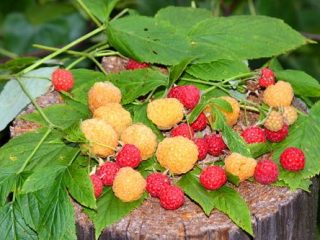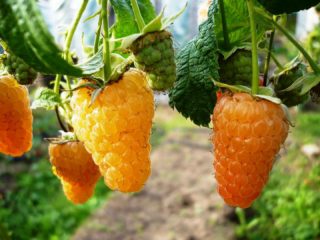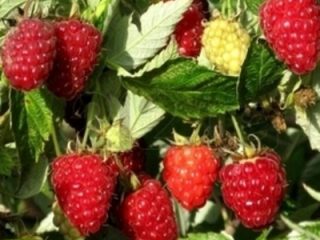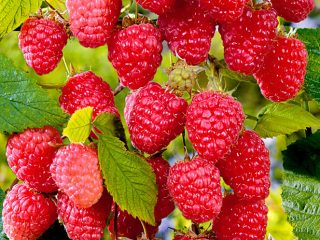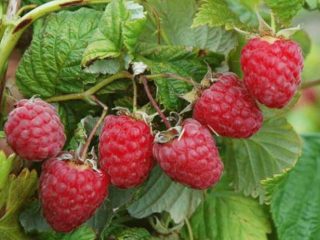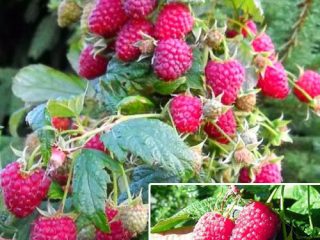Content
Raspberry Black Jewel is a valuable variety of berry crop that is of particular interest to gardeners. Before planting a shrub on a site, you need to study its main features and care requirements.
Breeding history
Black Jewel is a young hybrid chokeberry raspberry bred by American breeders at Cornell University in New York. The original varieties were Dundee and NY 29773. The hybrid combines the best commercial and taste qualities of its ancestors, has a minimum of disadvantages and is popular not only in the West, but also in Russia.
Description of Black Jewel raspberries
Before planting Black Jewel raspberries in your summer cottage, you need to study the description of the bush and berries. This will allow you to understand whether the plant is suitable for specific conditions and whether it will meet the yield requirements.
Berries
Raspberry Black Jewel bears fruit with round, black berries with a light whitish bloom up to 2.5 g in weight.The pulp is dense and elastic, but tender, the aroma is rich, with fruity notes, the taste is sweet without sourness. The berries are collected in clusters of 12-15 pieces; during the harvest period, raspberries are literally covered with clusters of fruit on all sides.
The ripening of the variety begins at the end of June or early July and continues until the beginning of September. At first, raspberries are red, but then they darken and by the time they are fully ripe they acquire a black tint. The fruits are easily separated from the bushes when picked, but do not fall on their own and remain on the branches for a long time.
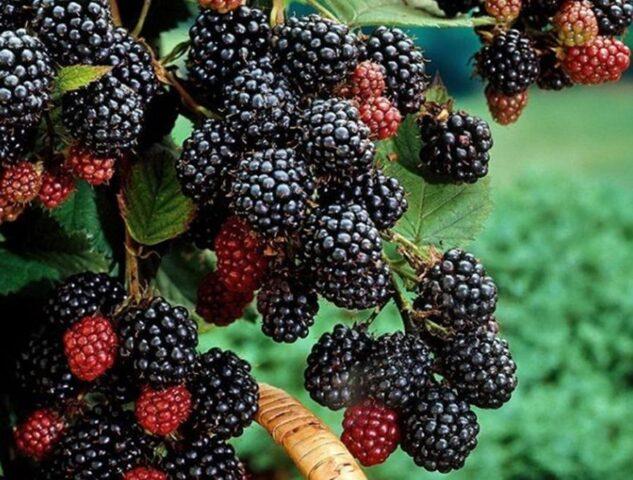
Black Jewel raspberries do not bake in the sun
Bush
Raspberry Black Jewel is a tall variety and reaches 2-2.5 m above ground level. The shoots of the shrub are straight, strong, with numerous lateral branches that appear from the second year and bear the main harvest. Young branches are elastic and flexible, covered with thin greenish bark with a whitish coating. In the second year they become woody and turn light brown. The Black Jewel variety has medium-sized spines that curve downward, but lacks root shoots, like most hybrids. Raspberry leaves are bright green, large, collected in trefoils, with slight pubescence on the lower surface.
Flowering of the Black Jewel variety begins in early May. Raspberry buds are white or cream, medium in size. On each meter of shoots you can count 20-25 inflorescences, consisting of 12-15 flowers. Raspberries do not require pollinators and form ovaries on their own; fruiting generally continues for ten years.
Characteristic
Raspberry Black Jewel attracts gardeners with the unusual appearance of the drupes. However, the variety is valued not for its decorative qualities, but primarily for its abundant fruiting.
Ripening time and yield
Hybrid Black Jewel belongs to the mid-season category. The first berries reach maturity at the end of July and continue to ripen until early autumn. The yield of a non-repairing variety is quite high - on average, about 1.1 kg of fruit can be harvested from an adult bush.
Frost resistance
The advantage of Black Jewel raspberries is its increased winter hardiness. The variety tolerates cold temperatures down to -35 °C even without shelter. At the same time, in the northern regions it is still recommended to insulate raspberries, especially if the winter was cold but with little snow.
Disease resistance
The immunity of Black Jewel raspberries is average. The plant is resistant to most pests and anthracnose, but often suffers from verticillium and powdery mildew. Typically, diseases develop in acidic soil, so when caring for the variety, you need to use nitrogen fertilizers with caution.
Advantages and disadvantages
Raspberry Black Jewel is recommended for growing in the middle zone and in regions with more severe conditions. The variety tolerates unfavorable climates well and calmly reacts to isolated mistakes made during care.
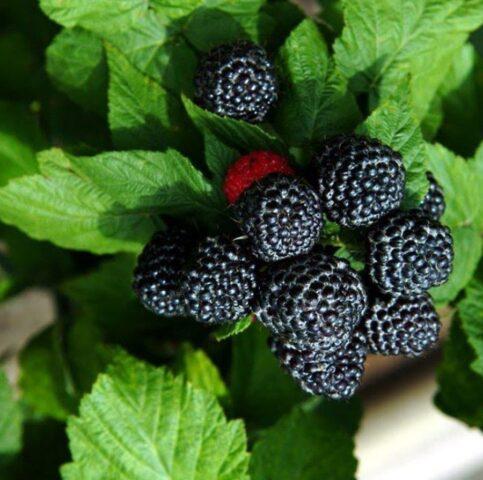
Raspberry Black Jewel is universal and suitable for dessert use and making preparations
pros
- high productivity;
- dessert taste of berries;
- good keeping quality and transportability of fruits;
- high frost resistance;
- unpretentiousness to growing conditions;
- good immunity to pests;
- attractive appearance of bushes;
- drought resistance;
- self-pollinating;
- lack of root shoots.
Minuses
- numerous thorns on the shoots;
- affected by powdery mildew and verticillium;
- seedlings are expensive.
Features of growing Black Jewel raspberries
The variety's growing requirements are simple. Caring for the bush is quite standard, almost the same as caring for ordinary red raspberries.
Landing rules
Planting Black Jewel raspberries in a summer cottage is carried out in early spring with the onset of warm weather or in the fall 2-3 weeks before cold weather. Choose a place for the bush that is well-lit, but protected from strong winds, with sandy or loamy soil.
About a month before planting, the area for raspberries is dug up and holes about 45 cm deep are prepared. A third of the holes are filled with a mixture of humus, compost and garden soil, and complex minerals and wood ash are also added.
The planting algorithm looks like this:
- The roots of the seedling are briefly soaked in water.
- The plant is lowered into the prepared hole.
- The feeding shoots are straightened on the sides of the earthen mound.
- Fill the hole completely with soil and water the raspberries generously.
Immediately after planting, it is recommended to mulch the plant so that moisture from the soil evaporates more slowly.
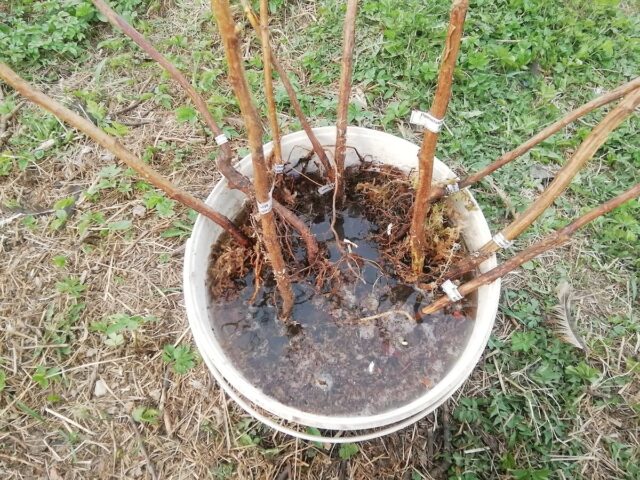
Before planting, it is recommended to treat the Black Jewel raspberry roots in water with the addition of a fungicide.
How to care
Caring for Black Jewel raspberries is quite simple and comes down to several steps:
- Watering. The plant needs additional moisture in the first year of life and during dry summer periods, especially during the ripening period. In the absence of rain, raspberries need to be watered twice a week, 30-40 liters per bush.
- Feeding. It is necessary to fertilize the crop three times per season - after the soil thaws, at the end of flowering and immediately after harvesting. In spring, nitrogen-containing fertilizer is added to the soil, and potassium and phosphorus are added in summer and autumn.
- Loosening. In order for the raspberry roots to receive a sufficient amount of oxygen, after each watering it is necessary to carefully turn the soil to a shallow depth. At the same time, it is necessary to remove weeds that take away moisture and nutrients from the bush.
- Trimming. In order for raspberries to bear fruit well and not suffer from fungi, it is necessary to trim the plant from time to time. From the second year, shoots of the bush are pruned to stimulate the development of lateral branches. The latter are trimmed in autumn to 1 m.
Although Black Jewel raspberries are frost-resistant, for the winter it is recommended to lay their shoots on the ground and cover them with spruce branches or non-woven material. First, you should carefully examine the bush and remove weak, dry and diseased branches.
Reproduction
There are two ways to propagate Black Jewel raspberries on your site:
- Dividing the bush. An adult plant over four years old is carefully dug out of the ground and cut along the rhizome with a sharp shovel. Several healthy shoots are left on each division. The resulting seedlings are immediately transferred to the prepared holes, dug in and watered.
- By layering. The lower shoot of the raspberry is bent to the ground, the top is cut off by 3-5 cm, the leaf blades are cleared and the branch is sprinkled with soil. To prevent it from straightening, it is secured with a staple or wire. The cuttings are regularly watered throughout the summer, and the next spring the new plant is separated from the mother bush.
Prevention of diseases and pests
Raspberry Black Jewel may suffer from some fungal diseases, but preventative measures can help reduce the likelihood of infection. When growing shrubs you must:
- from early spring to autumn, spray with Bordeaux mixture every 2-3 weeks;
- avoid waterlogging or excessive drying of the soil;
- control soil acidity and do not overfeed raspberries with nitrogen;
- Regularly thin out the bush to avoid thickening.
With the onset of autumn, it is important to remove all plant debris from the site. It is in fallen leaves that fungal spores and pest larvae usually overwinter.
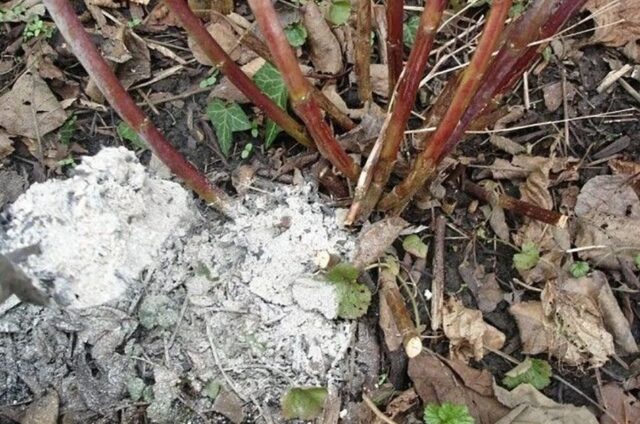
To strengthen the immunity of raspberries, you can feed them with wood ash three times a season.
Conclusion
Black Jewel raspberries have good taste and are easy to grow. The shrub does not have any special requirements for care; it is enough to provide regular watering and fertilizing.
